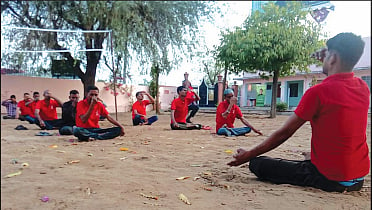India
Rajasthan becomes the first state to try and rehabilitate beggars
Can beggars be at all eliminated from a society that has a somewhat confusing stand on begging

Can beggars be at all eliminated from a society that has a somewhat confusing stand on begging. While begging for alms is common among ascetics, giving alms is often deemed to be an act of not just charity but also of penance. On the other hand, the state itself and city dwellers consider beggars a nuisance and to be eyesores. Many of them are suspected to be drug addicts and criminals and cities have tried to get rid of them from time to time.
While the Supreme Court intervened in February and ordered the Centre and the states to end the dehumanising anti-beggary Act which criminalises begging, the Centre believes it is a problem to be addressed by the states. Not surprisingly, a PIB release after the Supreme Court’s order stated, “As per the 7 th Schedule of the constitution of India and under serial no. 9 of State list, the subject matter of relief of the disabled and unemployable comes under the purview of state List.”
Activists have argued in the past that providing a safe shelter for beggars in the cities, a place where they can bathe, wash and sleep, could enable state agencies to monitor their health and activities better.
Published: undefined
But Rajasthan government has taken the pioneering step of launching BHOR (Bhikshuk Orientation and Rehabilitation) programme to rid first Jaipur and then the state of beggars.
‘Bhor’ in Hindi means dawn. The programme, being run in partnership with NGO Prayas, aims to bring a new dawn by motivating families dependent on begging to acquire various life skills. The Rajasthan Skilling and Livelihood Development Corporation (RSLDC), which is the executing agency for the pilot project, has selected 100 former beggars for special training. Talking about the programme, Niraj K Pawan, Principal Secretary Labour, Skilling and Rehabilitation in Rajasthan says, "This is a unique programme in the country started under the guidance of Chief Minister Ashok Gehlot to empower the beggars to lead a life of dignity entitled under the Indian Constitution to every individual."
"We had selected 1168 beggars from Jaipur, to be exact, out of which we have chosen 100 in the age group of 30-35 years who are able-bodied for the four-month long training. The aim of this initiative is to make Jaipur ‘Bhikhari-mukt’,” he adds.
Published: undefined
Indu Rani Singh, Director, Special Projects at Prayas says that the ground work and research for the BHOR project had been started in 2019, soon after Gehlot government came to power in the state.
"As one can imagine, it's not easy to bring these people under any kind of discipline. Most of them were given to smoking and drugs. Since we did not allow that, almost half of those we had brought in ran away,” she recalls.
“They had to be first bathed, cleaned and made physically fit for the training. They were given uniforms, and for about 15 days they were made to work on their physical stamina by performing yoga and playing games like football etc.A majority of them showed interest in cookery in the beginning. Others are receiving training to work as confectioners, electricians, plumbers and security guards,” she added. They are being trained at ‘Kaushal Vardhan Kendras’ run by the three NGOs roped in by the government.
Singh says that Prayas, that has been working mostly with children and women for the last 32 years, is also planning to start a training programme for a group of about 120 women also. The Rajasthan government intends to gradually expand the programme to other cities.
Published: undefined
Follow us on: Facebook, Twitter, Google News, Instagram
Join our official telegram channel (@nationalherald) and stay updated with the latest headlines
Published: undefined